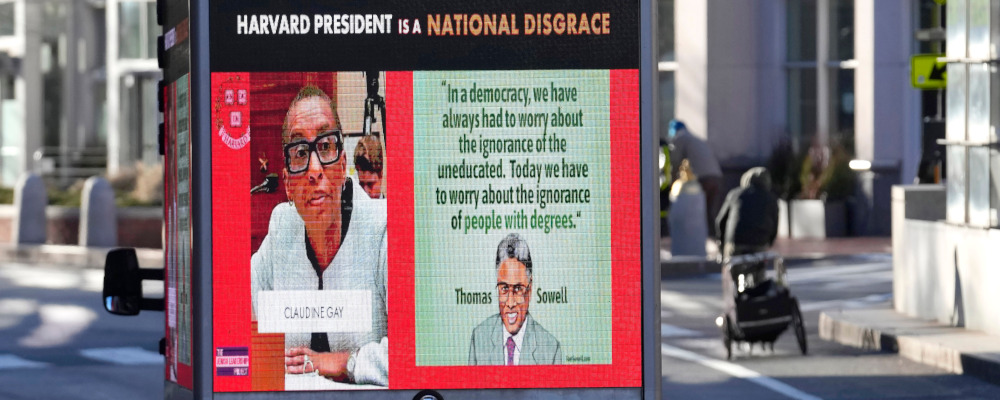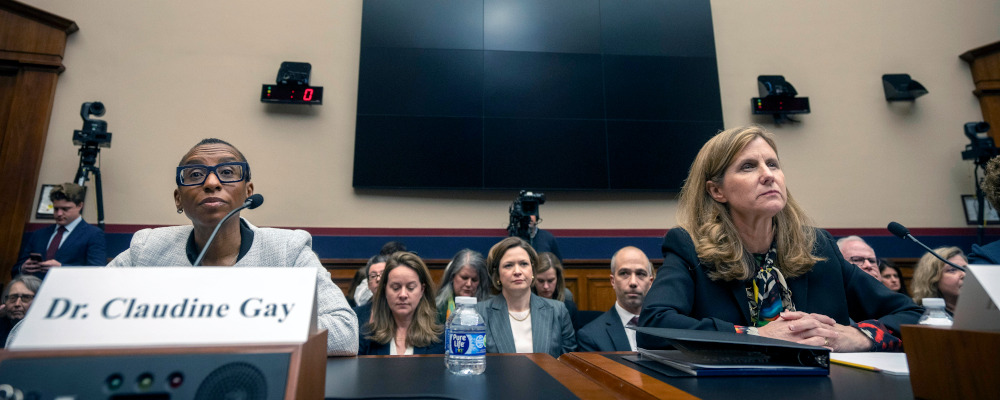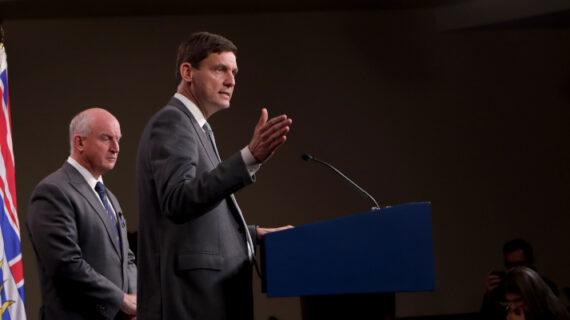North American universities are facing a moment of reckoning. As Sean Speer noted in a recent Hub Dialogue podcast, one unanticipated consequence of Hamas’ October 7 attacks is that it placed additional “scrutiny on university campuses” regarding how much academic activity is focused on “ideological projects” rather than “the pursuit of truth.” In particular, the relationship between diversity, equity, and inclusion (DEI) initiatives and rising campus antisemitism has produced considerable public discussion about the mission of the modern university.
This tension between DEI, antisemitism, and intellectual rigour was present in the weeks-long saga that ultimately led to the resignation of Harvard President Claudine Gay. As a political scientist and administrator, Gay had long championed social justice and DEI-related initiatives. However, her presidency came under scrutiny on December 5, 2023, when, along with the presidents of Penn and MIT, Gay was widely criticized for her Congressional testimony about campus antisemitism. Although Penn’s president soon resigned, it initially appeared Gay’s apology would be enough to keep her job. However, after a stream of evidence was uncovered that Gay had plagiarized in eight pieces of writing throughout her academic career, she resigned as president on January 2, 2024.
In the aftermath, much was made of the donors and conservative activists who led the calls for Gay’s resignation, with some suggesting that, as Harvard’s first Black president, Gay was targeted because of her race. This made it easy to lose sight of what ultimately forced Gay to resign: plagiarism. Including her 1997 Ph.D. dissertation, Gay has 18 written academic works, ten of which are peer-reviewed journal articles. Two complaints submitted to Harvard accused Gay of plagiarism in 47 passages across eight of those 18 works between 1993 and 2017.
I have read the passages in the papers themselves, and it is clear Gay frequently used other authors’ words without including quotation marks, often without proper (or any) attribution. The most egregious examples—involving two peer-reviewed journal articles, one non-peer-reviewed article, one policy paper, and Gay’s dissertation—would unquestionably constitute plagiarism under the rules at my institution as well as Harvard.

As a political scientist myself, the most depressing part of the entire saga was what academic Tyler Austin Harper referred to as the willingness of “so many journalists and academics … to redefine plagiarism to suit their politics.” Harvard political scientist Steven Levitsky referred to Gay’s plagiarism as “mild sloppiness,” suggesting that quantitative scholars “don’t spend time fussing about their literature reviews.” Several scholars Gay had plagiarized even defended her. Political scientist David Cannon, from whom Gay had copied several sentences with extremely minor adjustments, no quotation marks, and no direct attribution, came to the astonishing conclusion that “This isn’t even close to an example of academic plagiarism.”
If you’re wondering why scholars were willing to defend obvious plagiarism, Harvard law professor Charles Fried said the quiet part loud: “If it [the accusations] came from some other quarter, I might be granting it some credence. But not from these people.” The “people” to whom Fried was referring were the conservative journalists and activists who first reported on Gay’s plagiarism, one of whom celebrated Gay’s firing as part of his goal “to eliminate the DEI bureaucracy in every institution in America.”
Canadian coverage
Although the Claudine Gay saga was an American story, it involved debates around antisemitism, DEI, and academic standards similar to those brewing at Canadian universities. The media itself also became part of the story, with duelling narratives that conservative outlets were targeting Gay while progressive ones downplayed her plagiarism. Accordingly, understanding how Canadian media covered Gay’s resignation can provide insight into how these debates are playing out for Canadian audiences interested in the state of higher education.
To get a sense of Canadian media coverage, I conducted a content analysis of online written articles from five mainstream media outlets—CBC, CTV, the Globe and Mail, the National Post, and the Toronto Star—from December 12, 2023 (the day plagiarism was first mentioned in any of these outlets) to January 9, 2024 (one week after Gay’s firing). During this period, these five outlets published 41 pieces in which Claudine Gay’s testimony, plagiarism, or resignation featured prominently. Because many of these venues published identical news stories created by third-party wire services, the actual number of individual stories was 32, with 14 “hard news” stories and 18 opinion columns.
In terms of hard news, they relied heavily on foreign wire services: only one of the 14 stories was written by a reporter working in house at one of the Canadian outlets. The remaining 13 were originally published by the Associated Press (10) and Reuters, CNN, and Bloomberg (one each). Seven of these news stories were written before Gay resigned on January 2, and seven were written after.
All 14 hard news stories featured antisemitism as a prominent topic, while 12 mentioned the plagiarism accusations. However, details regarding the sheer quantity of the plagiarism accusations against Gay were sparse; while 11 of the 14 stories made brief mention that Gay had been accused of plagiarism in “her dissertation” and/or in “three articles,” only one story made any reference to anything approximating the full scope of the plagiarism accusations against Gay—a single quote from a Harvard student that Gay “had 11 academic articles and six of them had problems with attribution.” By contrast, eight of the 14 stories took time to note that Gay had promised to issue “corrections” to her dissertation and the journal articles.
As soon as Gay resigned, the narrative in these news stories shifted dramatically. Before her resignation, Gay’s connection to DEI initiatives was only mentioned once in the seven news stories. After her resignation, it was mentioned in four of seven stories.
Claudine Gay’s race also became more prominent. Of the seven news stories before her resignation, only one discussed her race in detail; after her resignation, five of seven stories did, with four of those containing quotes from Gay’s supporters who felt her race was a factor in her resignation (see John McWhorter for an excellent critique of this argument).
There was also a post-resignation focus on the political motivations of those who called for Gay to resign. None of the seven hard news stories written before Gay’s resignation mentioned a “conservative” campaign to get Gay to resign. Instead, the stories typically referenced donors, alumni, and the Jewish community. By contrast, after Gay resigned, six of the seven hard news stories (86 percent) contained some reference to a “conservative” or “right-wing” campaign, including that the plagiarism was “unearthed” by “conservative activists”; that Gay’s “ouster came after sustained pressure by conservative politicians, activists and donors”; and that the Washington Free Beacon, which first reported the plagiarism, was a “conservative publication.”
The most prominent example of the focus on conservative activism was Collin Binkley and Moriah Balingit’s much–derided story from the Associated Press, originally titled “Harvard president’s resignation highlights new conservative weapon against colleges: plagiarism.” After criticism, the AP made numerous changes to the story, adding over 200 words of text and revising its headline. Although ostensibly on the topic of plagiarism, both versions provided minimal information about the details of Gay’s plagiarism, focusing instead on how the allegations of plagiarism “came not from [Gay’s] academic peers but her political foes.” CTV and the Toronto Star ran the revised story, while CBC ran (and continues to run) the original version, albeit under a slightly different headline. Why the CBC has retained the version that an AP spokesperson admitted “doesn’t meet our standards” remains unclear.
Opinion pages tell a different story
In addition to the hard news coverage, there were 18 Canadian opinion columns in which Claudine Gay featured prominently: 11 in the National Post, 6 in the Globe and Mail, one in the Toronto Star, and none from either CTV or the CBC. Nine were written before Gay’s resignation was announced, and nine after. Most of these columns were published specifically for a Canadian audience, with only three of 18, all in the National Post, previously published elsewhere.
By my count, two-thirds of the columns (12) were written by authors who publish at least semi-regularly in those newspapers. Of the six columns written by outside columnists, five were at the Post and one at the Globe.
Antisemitism was a prominent theme in the opinion columns (mentioned in 17 of 18), as was the role of DEI or “woke” policies at universities (15 of 18). Tellingly, and in stark contrast to the hard news coverage, when DEI was mentioned, it was critiqued: 14 of the 15 columns that mentioned DEI or “woke” policies described them negatively. Along these lines, the opinion writers were overwhelmingly critical of Gay, with 17 of 18 authors criticizing Gay or her congressional testimony.
As in the hard news stories, Gay’s race became more prominent after she resigned. Before her resignation, only one of nine opinion columnists discussed Gay’s race in detail; after her resignation, five of nine did. However, unlike the four post-resignation hard news stories that contained quotes from people who felt Gay was forced to resign because of her race, opinion writers at Canadian venues largely took the opposite view. Four of the five opinion writers who discussed Gay’s race after her resignation explicitly argued, in the words of Konrad Yakabuski, that Gay was forced to resign because of “her own actions and behaviour, not racism.” Opinion writers also generally rejected the narrative regarding the “vast right-wing conspiracy” to get Gay to resign. Four of the nine columns written after Gay’s resignation mentioned the narrative, but three of those explicitly disagreed with it.
Of the nine opinion columns written before Gay’s resignation, only one mentioned plagiarism; by contrast, all nine written after her resignation referenced plagiarism, and five of those nine (56 percent) used unequivocal language such as “multiple corroborated revelations of plagiarism” or “clear evidence of plagiarism.” Three of the nine post-resignation columns actually contained some detail about the quantity of Gay’s plagiarism, including “lifting half a page of material verbatim from the writing of another scholar,” that “there is clear evidence of plagiarism in eight of Gay’s 17 published works” and that the plagiarism allegations “span Gay’s entire academic career.” Ironically, after Gay resigned, Canadians were more likely to read about the quantity and details of her plagiarism in opinion columns than in hard news stories.

Finally, it is worth commenting on the Toronto Star’s solitary opinion column after the plagiarism allegations emerged, written by Shree Paradkar, the paper’s social and racial justice columnist. Of all the 18 Canadian opinion columns, Paradkar’s was the only one to argue that Gay was forced to resign because of her race, to support the narrative that “right-wing activists” caused her firing, to speak positively about “anti-oppression” frameworks common to DEI initiatives, and to approvingly cite a reference to Israel as “an apartheid state.” Moreover, Paradkar did not describe Gay’s plagiarism in any detail; she referred only to “accusations of past plagiarism by a conservative online journal” and quoted an author who claimed Gay was “targeted” by “old-school racism that’s hidden under claims of plagiarism and antisemitism.” While these conclusions were unsurprising to anyone familiar with Paradkar’s work, what is perhaps most telling is that her column was an outlier in virtually every respect when compared with columns in the Globe and the Post.
Implications for Canadian media
This empirical examination of how the Canadian media covered Harvard president Claudine Gay’s plagiarism and subsequent resignation leads me to three conclusions. First, the Canadian mainstream media’s reliance on the Associated Press to deliver “hard news” only further exacerbates what Steve Lafleur refers to as our habit of “uncritically echoing American talking points.” In the case of Claudine Gay’s resignation, not only did Canadian media outlets import American culture war terminology, but by relying almost exclusively on the Associated Press they provided an incomplete account of the latest battle in those wars by publishing news stories that focused more on the critics of Gay’s plagiarism than the details of the plagiarism itself.
Second, if Canadians wanted to understand the news, they often had to read the opinion pages. Op-eds in the Globe and Mail and National Post were more likely to describe and analyze Gay’s plagiarism than any of the hard news coverage. Readers of the Toronto Star, CTV, and CBC, by contrast, would have read little about the scope and substance of the plagiarism allegations against Gay, and far more about how Gay was a casualty of a devious conservative campaign against DEI.
Third, and ominously for Canadian universities, the zeitgeist among mainstream opinion writers is not on the side of diversity, equity, and inclusion. Even in a media environment where hard news coverage was sympathetic to Gay’s perspective, 14 of 15 opinion columns that mentioned DEI or “woke” policies were critical of their influence on universities, with the Toronto Star the predictable lone exception. This criticism did not just come from the usual suspects at the National Post; they included Globe columnists not known for their conservative inclinations.
This final point offers some optimism for those concerned about the state of higher education in Canada. In a recent Hub article, a senior university administrator lamented how prominent scholars’ willingness to justify Claudine Gay’s plagiarism sent the message that “in the modern university, ideology trumps academic integrity.” If so, it appears that that message is not shared by opinion writers at major Canadian media outlets, who are pushing back against Canadian universities’ ideological and activist excesses. A shift in public opinion may be similarly afoot. If so, Canadian universities’ moment of reckoning could come sooner than we think.




